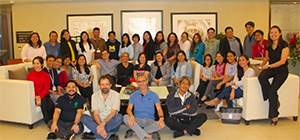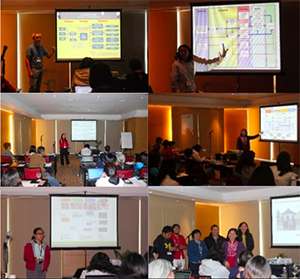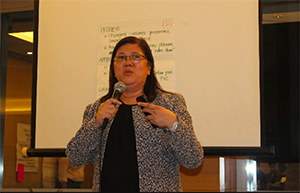 Agribusiness Master Class (AMC) Philippines was officially launched through the conduct of its first module on November 25-29, 2019 at the Quest Hotel and Conference in Cebu.
Agribusiness Master Class (AMC) Philippines was officially launched through the conduct of its first module on November 25-29, 2019 at the Quest Hotel and Conference in Cebu.
The class was launched by the Australian Centre for International Agricultural Research (ACIAR) and the Philippine Council for Agriculture, Aquatic and Natural Resources Research and Development of the Department of Science and Technology (DOST-PCAARRD), together with the Commonwealth Scientific and Industrial Research Organisation (CSIRO), Foodlink Advocacy Co-operative, and the University of Queensland.
Ms. Mai Alagcan, Country Manager of ACIAR Philippines, and Dr. Lilly Lim-Camacho, Research Group Leader of CSIRO, formally opened the first module of AMC Philippines.
Consisted of 30 individuals, the chosen participants are from the Department of Trade and Industry (DTI), DOST-PCAARRD, University of the Philippines Mindanao (UPM), University of the Philippines Los Baños (UPLB), Visayas State University (VSU), University of Southeastern Philippines (USeP), Central Luzon State University (CLSU), Aboitiz Foundation, Rooted Seed Stories Corp., Farmwatch Solutions Inc., Foodlink Advocacy Co-operative, Grow Asia, Apostol Techno-Demo Learning Farm Inc., and San Felipe Cooperative.
Serving as mentors were agribusiness and value chain experts from Australia, Portugal, and the Philippines. These include Dr. Lilly Lim-Camacho; Dr. Oleg Nicetic, Research Fellow at the University of Queensland; Mr. Anton Simon Palo, General Manager at Foodlink Advocacy Co-operative; and Mr. Tiago Wandschneider.
During the first three days, participants were introduced to value chain frameworks and concepts; methods and tools in conducting value chain analysis; and fundamentals of market research. They were also given group activities and simulation exercises on value chain mapping and designing research questions.
The fourth day was allotted for the fieldwork, wherein participants had to do a rapid appraisal value chain analysis of the commodity assigned to them. They were grouped into five and assigned with the following commodities: cacao, carabao dairy, lechon, danggit, and chicharon.
Findings were presented on the last day of the activity. Participants also came up with ideas for their ‘mini-projects,’ which they will work on through their AMC journey.
The completion ceremony of Module 1 was graced by Dr. Fezoil Luz Decena, Director of the Institution Development Division (IDD) of DOST-PCAARRD.
 Dr. Decena envisioned that through AMC, value chain approach will be widely-promoted and utilized in understanding industries and generating R&D areas. This, she added, is to help industries in a more realistic and grounded way.
Dr. Decena envisioned that through AMC, value chain approach will be widely-promoted and utilized in understanding industries and generating R&D areas. This, she added, is to help industries in a more realistic and grounded way.
While Module 1 focused on providing the participants with key principles and frameworks around value chains, the next two modules in February and April 2020 target to delve deeper into how chains work against multiple objectives and drivers, as well as to equip participants with skills and knowledge on how to develop and evaluate value chain strategies.
AMC is a series of classes that aims to develop participants’ knowledge and skills needed to influence the agribusiness value chain development in developing countries. Specifically, it targets to embed value chain thinking in designing and planning for projects and programs in the respective sectors of the participants.
Initially piloted in Vietnam in 2015, AMC was also held in Myanmar and the Pacific.
AMC Philippines hopes to produce its first batch of graduates in April 2020.
